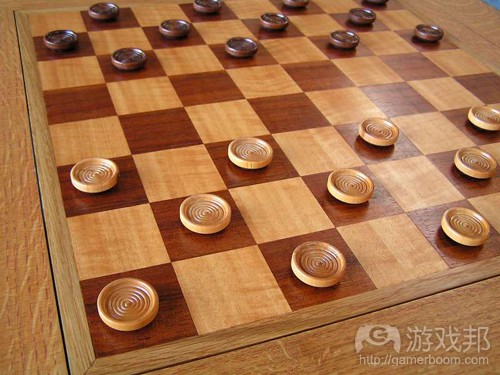游戏设计师应如何让玩家做出有趣的决策?
作者:Jon Shafer
知识就是力量。但是游戏设计师却常常因为忽视了这句老话而陷入危险中。作为开发者我们总是希望游戏能够让玩家实现自己的幻想,但是通常情况下却都是游戏本身在阻碍这种实践。
不论是在游戏里还是生活中,我们总是会因为不清楚该做什么而感到不安。大多数游戏都会要求玩家做出各种选择,但是如果游戏不能够提供足够的信息帮助他们自信地做出选择,最终只会让玩家遭受挫败。
在本篇文章中我们将详细阐述信息在游戏中所扮演的角色,为何有意义的选择需要提供情境但是事实上我们却常常忽视这一点。我将通过列举一些例子进行说明,同时我们也将发现在某些特殊情况下,隐藏某些信息也能创造出更棒的游戏。
有趣的决策
设计师的目标便是为玩家创造出各种有趣的决策。“有趣的决策”是指玩家拥有2个以上长期等价的选择。相反地,也存在两大因素将会导致游戏缺少乐趣——当一个选择比其它选择更加有利,及当选择的结果不够明确时。
如果玩家因为决策而感到困惑,那么他们面对选择的感受将会从矛盾慢慢转变为厌烦。如果游戏缺少情境,玩家便只能选择那些看起来最简单,听起来最酷,或者位于列表最前方的选择。如此玩家便不可能投入过多精力于这些抽象的选择中,而如果他们在之后发现自己的选择并不合理,他们也只会去责怪游戏而不是自己。
当玩家失败后他们便会想道:“我本应该选择X而不是Y。让我再试一遍看看能不能做得更好。”但是这也只会出现在玩家觉得游戏是公平的,且期待看到游戏最终结果的前提下。
如果你希望玩家能够做出策略型决策,那你就需要明确公开游戏机制。例如,一款游戏拥有可升级的装备,那么设计师就需要解释清楚装备武器后会出现何种结果。
告诉玩家他们的行动会造成多大的伤害,比告诉他们神秘且抽象的攻击加值为5有用得多。5代表什么?如果玩家使用的所有武器都带有单一的攻击值,那这便不是什么大问题;但是如果玩家必须从+5攻击武器和+7防御盾中做出选择情况又是怎样的?如果不能完全理解这些数值的含义,玩家又该如何比较武器所代表的值呢?
创造一些无知选择的主要问题还在于玩家很难对此提起兴趣。你可能已经熟悉于之前的武器每一发能够造成10点的破坏力,并且需要连击4次才能杀死怪物,但是当你购买了新武器,也就是每一击能够造成16点的破坏力并且只要连击2次便能够杀死怪物时,你可能会因为感受不到之前的那种刺激感而失去了游戏兴趣。
只有当玩家清楚游戏中发生了什么,游戏才算真正开始。从而玩家能够开始制定计划,并努力权衡短期和长期利益。如果游戏能够带给玩家这种程度的舒适感,玩家便会愿意更长时间地坚守于游戏中。
完整的信息
通常情况下提供给玩家尽可能多的信息总是非常有帮助,但是有时候这也会破坏了一款游戏。特别是当玩家拥有全面的信息,即了解游戏所有内容时。
西洋棋(游戏邦注:又称国际象棋或欧洲象棋,是一种二人对弈的战略棋盘游戏)便是一个很典型的例子,因为游戏的整个棋盘和所有棋子都完全暴露在玩家面前。也就是游戏并未隐藏任何游戏元素。
几乎每一款游戏都需要一些不可预知元素,而“纯粹的”策略游戏便是绝佳例子。通常情况下,这种不可预知元素总是来自其它玩家,不管是真人还是AI。如果玩家总是知道敌人下一步的行动,那么游戏的紧张感便会大大受影响!
那些缺少不可预知元素的纸牌游戏需要采取其它方法去创造新鲜感,而随机性便是一种非常合适的方法。玩家所熟悉的纸牌游戏都会使用一个随机的桥牌。因为如果玩家每次看到的纸牌顺序都相同,那么游戏的重玩价值也就微乎其微了。
然而也并不是只有那些未涉及人类玩家的游戏会受到信息完整性的影响。上诉提到的西洋棋最近便“解决”了这一问题——即如果双方玩家都未出错,那么游戏的最终结果便是平局。
在游戏中添加某些隐藏信息便能够有效阻止单一策略支配游戏的情况。在许多策略游戏的地图中总会覆盖着一层“战争迷雾”,而玩家就必须通过不断探索去揭开隐藏在黑暗中的秘密。
有时候甚至是地图本身也会随着时间的变化而变化。例如在最近的《文明》中,技术研究便能够揭示一些新的资源。它们的陡然出现将会很大地改变特定情境下的“完美”策略。而玩家需要不断适应前所未知的环境便是游戏中的一大乐趣。
在单人游戏中隐藏信息尤为重要。在大多数游戏中我们很难创造一个能够与游戏中的佼佼者进行较量的AI。而如果人类玩家能够清楚地掌握整个游戏局势,他最终也会了解AI的游戏模式,并无情地击败它。所以采用这种模式的游戏很快便会失去一时的乐趣和魅力。
游戏需要隐藏多少信息主要取决于设计师的选择和目标。纸牌游戏《Dominion》在每个环节的一开始便提供给玩家10张随机行动纸牌,玩家难以预见自己会收到何种排序的纸牌更是增添了游戏的重玩价值。
但是那些玩了好几遍游戏的玩家将会逐渐看清游戏的纸牌设定,所以便会觉得《Dominion》是一款刻板的游戏。虽然添加更多随机元素或隐藏信息能够完善这些玩家的游戏体验,但是与此同时却有可能剥夺了其它玩家的游戏乐趣。可以说比起科学,游戏设计更像艺术。
不完整的信息和风险
游戏的目标是确保有效地权衡每个决策。要么选择较小但却更安全的选择,要么选择风险较大但却作用性更强的选择。
一般来看这种做法总是很有效,因为安全简单的选择能够在短期内给予玩家回报,而具有长远作用的选择因为会带动其它元素发挥作用所以也更具有风险性。
如果一个选择只有“25%的成功概率”以及“75%的一般概率”,那么玩家肯定不愿意投机地做出策略性选择。
尽管这种决策有时候也很有效,但是仅凭一个只有50%的击中率以及50%的破坏力,或拥有90%的击中率但却只有25%的破坏力的武器,玩家实在很难做出有趣的决策。
通常情况下玩家总会做出一些安全的选择(特别是当他们做出一些大选择但却连续三次遭遇失败时)。在现代游戏中我们很少能够看到这种机制了,不过在一些日本角色扮演游戏中偶尔还能够看到它们的身影。
我们可以在一些体育团队管理模拟游戏(即带有长期玩家发展元素或受伤/新股弱势等风险)中找到相互作用的短期安全选择和持久风险选择。
在过去六个多月的时间里我一直在玩一款基于文本的模拟游戏《劲爆美国棒球》,并且在游戏中周旋于各种痛苦的决定——我是否应该在一个人还年轻,发展空间仍旧渺茫的前提下卖掉他?我是否应该以两个前景渺茫的包裹去换取一个较为安全的包裹?正是不能预计未来加上对于游戏机制的理解,某些前景发生概率的证明结果,玩家的伤病史,某些位置的价值等等结合在一起提供给了玩家非常有趣且复杂的决策。
这种权衡几乎可以使用在任何游戏中。我是否应该对邻居宣战?不知道我用于占领他们领土的资源是否会超过我所能够承受的范围?我们是否应该去攻击游戏中的任意boss并尝试着打开一个新的探索领域?虽然为了做出决策玩家必须知晓大量的信息,但是我们却不能低估不完整的信息所带来的积极影响。
例外
我知道有些人并不认同我所持有的这一观点,并宣称游戏需要的“不只是数字”。我从未反驳游戏值所带来的别样趣味。许多参杂了各种数字的有效设计方法也带给了玩家各种乐趣。而我们真正需要掌握的要点其实非常简单,也就是当提到游戏机制时我们能够同时感受到策略与情感的存在。
《矮人要塞》便是一款未与玩家过度分享游戏内容的典型游戏。游戏主要是关于探索游戏空间并让玩家在出现任何疯狂的事后放声大笑。尽管大多数玩家并不想面对喝药水的风险并因此而终止了游戏,但是还是有很多玩家会这么做,而开发者却不能取消这种设置。一般来看这也是roguelike类游戏所突出的一大特征——即一个小问题将会破坏一切。
每个开发团队都需要明确在策略vs.情感的范围中,他们希望自己在哪里着陆。游戏的目标是什么?谁是我们的目标用户?我们希望玩家在面对一些特定事件时有何感受?所有玩家都是不同的,所有游戏亦是如此。
结论
在游戏设计过程中设计师真正需要在意的是玩家的想法。你可以创造一个最酷,最复杂的系统模式,但是如果玩家根本不清楚游戏中发生了什么以及游戏情境中有何乐趣,那么所有的这些设置便都是徒劳。当玩家掌握了游戏机制以及它对自己决策的影响,他便能够将其转变成自己在游戏中最独特的体验——也就是这时候游戏才算真正走上成功之路。(本文为游戏邦/gamerboom.com编译,拒绝任何不保留版权的转载,如需转载请联系:游戏邦)
The More You Know: Making Decisions Interesting in Games
by Jon Shafer
Knowledge is power. Game designers ignore this old adage at their own peril. As developers we want our games to empower people to live out their fantasies, but all too often the games themselves get in the way.
Whether in games or in life, we’ve all experienced that uncomfortable feeling of having no idea what to do. Most games require players to make a vast number of decisions, and if they’re not provided enough information to make those choices confidently, the end result is nearly always frustration.
In this article we’ll examine in detail the role of information in games, why meaningful choices require context and the consequences of omitting it. We’ll also look at a few examples of how, in unique cases, hiding some things can actually make a game better.
Interesting Decisions
A designer’s goal is always to make every decision the player faces interesting. An “interesting decision” is when a player has two or more options which are (roughly) equal in value over the long term. Conversely, there are two main factors which can make decisions uninteresting: when one option is clearly better than all others, and when the consequences of the options are unclear.
If someone is confused by a decision, their feelings toward the choice will range from ambivalent to annoyed. With no context, they’ll simply choose the option that is easiest, sounds coolest, or (gulp) is first in the list. It’s impossible to be heavily invested in such arbitrary decisions, and if the excrement hits the fan later on, they’re much more likely to blame the game than themselves.
After people fail, the goal should be for them to think, “Dang, I really should have chosen X back there instead of Y. Let me try again and see if I can do better.” This only happens if players feel like the game was fair and sufficiently prepared them for what was to come.
If you want players to really be making strategic decisions, then the mechanics of the game need to be laid bare. For example, a game with upgradeable equipment needs to fully explain the consequences of equipping a weapon.
Knowing how much more damage you’ll be doing is much more useful than being told the player’s mysterious and arbitrary attack value is increased by 5. Five what? It’s not a big deal if all you’re dealing with are weapons with a single attack value, but what if you have to choose between a +5 attack weapon and a +7 defense shield? How does one compare their value without a full understanding of what these stats actually mean?
Another major issue with making uneducated choices is that it’s hard to get excited about them. You feel a real sense of progress knowing your old weapon did 10 damage per swing and could kill those monsters with four hits, but that new one you bought does 16 per hit and can kill them with only two swings. Just knowing that now you’ll do “more damage” doesn’t provide quite the same thrill.
When you know exactly what’s going on, that’s the point at which a game really takes off. This provides the opportunity to start making plans, and the trade-off between short-term and long-term interests becomes a very tough call. If players are able to reach this level of comfort, they’re likely to stick with a game for the long haul.
Perfect Information
While providing players with as much information as possible is usually ideal, there are situations when it can hurt a game. One such case is when the players have perfect information — that is, they know everything there is to know.
A good example is the game checkers, where the entire board and all pieces are visible. There are no elements of the game itself which are hidden from either player.
Nearly every game needs some element of surprise, and “pure” strategy games are the best example. In many cases, this element is provided by other players, be they human or AI. If you always knew exactly what your opponent’s next move was, there wouldn’t be a whole lot of tension!
Solitary games that lack an unpredictable opponent need some other way of spicing things up, and some form of randomization is virtually always the answer. The solitaire card game that nearly everyone is familiar with uses a randomized deck. If the card order was the same every time, there would be almost zero replayability.
However, it’s not just the games without human players that are seriously damaged by perfect information. The aforementioned checkers was recently “solved” — meaning if neither player makes a mistake, the end result will always be a draw.
Having some form of hidden information is a crucial element to preventing a single strategy from dominating. In many strategy games, there is a “fog of war” which covers the map, and exploration is necessary to reveal what lies in the darkness.
Sometimes even the map itself changes over time. For example, in the recent Civilization games, technological research reveals new resources. Their sudden appearance can greatly alter the “perfect” strategy for a given situation. This constant need to adapt to previously unknown circumstances is a big part of what makes games fun.
Hidden information is especially important in single-player games where AI opponents are simply executing lines of code written by a human programmer. In most games it is nearly impossible to develop an AI that will compete with the best of the best. If the human player is also able to see the entire game situation clearly, it’s only a matter of time before the AI’s patterns are learned, dissected and ruthlessly exploited. A game solved in this manner quickly loses whatever charm and joy it once held.
The amount of information that “should” be hidden can vary greatly, and ultimately depends on the preferences and goals of the designer. The card game Dominion makes 10 random action cards available to players at the beginning of each play session, and the inability to predict the order in which cards are drawn provides a great deal of replayability.
However, those who have played enough games will begin recognizing the optimum strategies for a given set of action cards, and Dominion has become formulaic for some. Adding more randomization or hidden information would probably improve the game for these players, but it might also make it less enjoyable for others. Hey, game design is more art than science.
Imperfect Information and Risk
The goal is to require some form of trade-off with every decision. One example of this is choosing between a smaller but safer bonus, and a riskier but much more powerful one.
This generally works best if the safer bonus is safe simply because it pays off in the short term while the other option pays off later and is riskier because other factors can come into play.
If the choice is basically just between “25 percent chance something really good happens” and “75 percent chance something okay happens” you’re not really making a strategic choice as much as you’re gambling.
While this can be made to work, it’s tough to make an interesting decision out of swinging a large weapon that only hits 50 percent of the time but does 50 damage or using one that hits 90 percent of the time and does 25 damage.
More often than not players will go with the safer option (especially if they try using the big one and it misses three times in a row — good luck getting them to try using it again!) This sort of mechanic is fairly rare in modern games, but I still see it pop up in a few Japanese RPGs.
You can find good examples of short term safety versus longterm risk working really well in pretty much any sports team management sim where there is a longterm player development aspect or the risk of injury/underperformance.
Chrono Cross
I’ve been playing a lot of the text-based sim Out of the Park Baseball for the last six months or so, and there have been some agonizing decisions — should I trade this guy in his prime for a collection of younger, less-developed and much riskier prospects? Do I send off a package of two risky prospects in exchange for one safer one? The inability to predict the future coupled with an understanding of the game’s mechanics, the likelihood of certain types of prospects panning out, the players’ injury history, the value of certain types of positions, etc. all combine to provide a set of very interesting and very difficult decisions.
This sort of trade-off can be applied in nearly any game. Should I declare war on my neighbor, hoping that the resources I expend to capture their lands add up to less than what I stand to gain? Is it worth the risk to attack that optional boss and try to open up a new area to explore? Players need to be equipped with some measure of information for this to be possible, but don’t underestimate the positive impact imperfect knowledge can provide.
The Exceptions
I know some people disagree with me on this topic and claim that a game needs to be “more than just numbers.” You won’t find me arguing against the value flavor and “feel” provide. There are an innumerable number of valid design approaches that can result in a game enjoyed by a large audience. The point is simply to recognize that when it comes to game mechanics there’s basically a scale that has strategy at one end and flavor at the other.
One great example of a game which definitely doesn’t go out of its way to share everything with the player is Dwarf Fortress, which is all about exploring the game space and laughing as all sorts of crazy things happen. While most players don’t like there being a risk of drinking a potion and the game permanently ending right then and there, there are absolutely some who do and we developers definitely shouldn’t write them off. The roguelike genre in general is characterized by this possibility of a single mistake derailing everything.
Dwarf Fortress
Every development team has to decide for itself where on the spectrum of strategy-vs-flavor it wants to land. What is the goal of the game? Who is our target audience? What do we want players to feel when certain events happen? No gamer is the same and no game should be either.
Conclusion
A point I often make when discussing game design is that the only manner in which a game really matters is inside the player’s head. You could have the coolest, most complex system modeling some really interesting phenomenon… and it’s completely irrelevant unless the player knows what’s going on and how to have fun with the situation. When someone understands the mechanics and the implications of their decisions and is able to translate that into a completely unique experience — that’s when a game really succeeds.(source:GAMASUTRA)
上一篇:基于心理学视角论述游戏排行榜设计










































 闽公网安备35020302001549号
闽公网安备35020302001549号